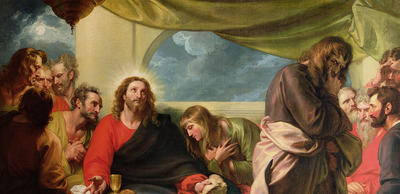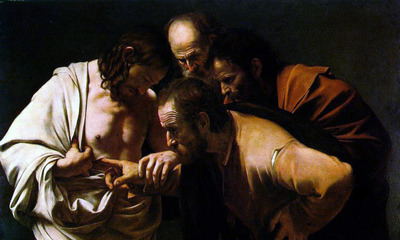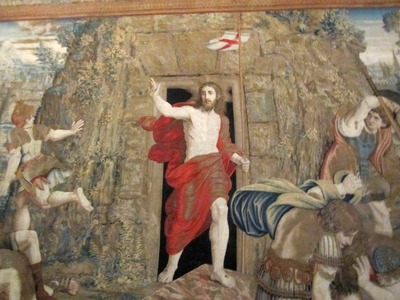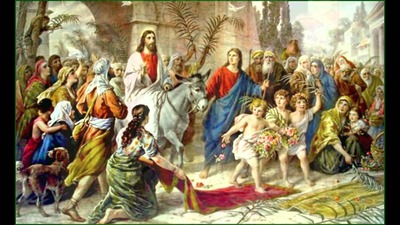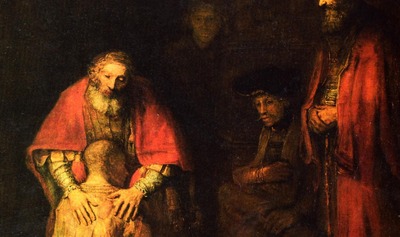May 25, 2025
|by N W
|
0 Comments
|
Guest Celebrants, Holy Spirit, Light, Peace
Sixth Sunday of Easter
May 25, 2025 — Year C
Readings: Acts 15:1-2, 22-29 / Ps 67 / Rv 21:10-14, 22-23 / Jn 14:23-29
by Msgr. Michael McCarron, Guest Celebrant
When I was in my 20s and had just been ordained a deacon and was working in my diaconal assignment, the pastor with whom I was working was quite a character, to say the least. He was a brilliant man, but sometimes with some rough edges. I don’t think he would mind my saying so. In any case, when the gesture of peace would come around, I was with him on the altar, of course, and he was a powerful man. He wasn’t large of stature, but he had some real oomph, I would say, and he would come to give me the gesture of peace in what today would be similar to a chest bump. He would grab me and look at me and say, “May the peace of Christ always disturb you.” The first time it happened, I said, “Well, and with your spirit.” I didn’t know quite what to say, but I did think to myself, “Boy, I hope this doesn’t catch on.” But it caught on to me. The reality is that it comes right out of today’s gospel.
“Not as the world gives you peace.” Not that complacent, calm, serenity business, not that kind of peace. This is His farewell discourse. This is what He’s saying right before He gives Himself up to death for our sake. These are the chapters in which there is so much richness. He’s proclaiming all of this to his friends, His kind of last will and testament at the Last Supper. The whole new world is about to dawn, and they don’t have a clue as to what is about to transpire. I don’t just mean the trouble but what the trouble will usher in—the shattering of an old world is about to happen. To call “peace” peace and place it in the context of what’s coming. Everything He says is true, but wow!
Not as the world gives you this peace; it’s a peace that will disturb you. When you, peaceful in My love, see hatred, it’ll make you crazy. You won’t like it. You’ll feel viscerally the presence of evil when you’re in its presence and, you know, that’s psychologically true. When we’re in the midst of something very wrong, we feel it in our gut. Jesus feels this way when He raises Lazarus from the dead—He knew this was wrong. It’s the peace that allows us to see that things really aren’t the way they’re supposed to be. It’s reaching back into that primal instinct from our first days before the Fall, where the remnants of that time that we only glimpse once in a while still linger in our ancient memories. It’s that peace that tells us this isn’t the way it’s supposed to be. And we have spent how long, how many thousands of generations trying to bury it because it does disturb us? We throw our hands up. There’s nothing I can do about it. It’s not my job. My little bit won’t help.
Thank God for the Saints, regularly appearing in the midst of that denial to remind us that the disturbing peace of Christ does, in fact, do wonderful things. Oh, that’s not just a story. We all know that. Anybody here happily married? If you are happily married, even with all the struggles in that happy marriage, you felt this peace. Why else would two normally sensible people look at each other at the ripe old age of 18, 19, 20-something, and say, “I’m going to be with this person forever?” Right. Yes. Why would a man lie on the floor of a cathedral and say, “I will foreswear sexuality and my own will for the obedience to a Bishop I don’t even know, and I will live with God’s people as my family until I’m as old as McCarron and longer?” Why? Because the peace of Christ disturbs us enough to have a glimpse of what the world is like when we listen to it. And so, when we don’t listen to it, what do we get? We get dry, and wizened, and dark.
The readings today are filled with fabulous one-liners. I mean if you are going to embroider something, go to these readings. Put them on a cushion. Like the second reading from the Book of Revelation, one of my favorite books in the scriptures. Of course, it’s everybody’s favorite for all the right and wrong reasons. In this wonderful, wonderful statement where John says, as he looked at the new Jerusalem coming down out of Heaven, that no sun or moon was needed for light in the city of God, because the glory of God shone on it and the Lamb was its lamp. You hear what he is saying? He’s saying that, when you have Jesus, you don’t need the lesser lights, the lesser lights that we rely on. We all rely on a lot of things to protect ourselves from what people think or say, to build ourselves up. John is basically saying, if you’re relying on Jesus, you don’t need to rely on anything except His choice of you. Don’t rely on your worthiness, because you ain’t got it!
I was a vocations director for about 18 or 19 years in our diocese, and I remember asking one person what was preventing him from becoming a priest. He said, “Well, I don’t think I’m worthy for priesthood.” I looked at him and said, “Really? What sacraments ARE you worthy for?” And the answer is none, but we are chosen for all of them. The Lamb is its lamp. When we are in love with Jesus Christ, when we spend time with Him, and yes, sometimes that is time for prayer, and sometimes it’s time before the Blessed Sacrament, but it’s also time before the blessed sacrament that is your husband, the blessed sacrament that is your wife, the blessed sacrament that’s your girlfriend, the blessed sacrament that is your boyfriend, your brother, your pesky little sister. It’s spending time before them. Do you think your guardian angels are looking at you and they linger because of your good looks? Sorry, they see in you the spectacular gift of the Lamb shedding light in the image of God. You are that gift, and the persons you live with are, too. How cool is that?
And if that weren’t enough, of course, we have in today’s first reading the sending of this letter. These poor people are getting bombarded by folks telling the Gentiles, well, it’s OK, you are welcome to be a Christian, but you’ve got to become a Jew first. And they meant it! They said that God made this covenant, and God’s covenant is made full in the Messiah, Jesus of Nazareth, who is a Jew and a rabbi, and so you must follow what He followed, and He followed the law. So, the apostles didn’t know what to do, because the Gentiles weren’t having any of that. I mean, you can imagine, I want to be a Christian, but you have to be circumcised first. Never mind! And you know, they weren’t being silly. I mean, obviously, there was pain involved, but that wasn’t the problem. The problem was that the pain involved could be lethal. This wasn’t the days of antibiotics and antiseptics. The knife you were doing a circumcision with today was the one you used to cut your fish with tomorrow and the day before. People died of circumcision; they said, there must be something wrong with this.
And so, they say in their letter that “it is apparent to the Holy Spirit and to us.” Don’t you love that line? Can you imagine using that line when your teenage son comes home after curfew, and he knows he’s wrong? You know he’s wrong. He gets to the door and you go, “It appears to the Holy Spirit and to your mother and I that you are grounded for a week.” I mean, what is he going to say? The Holy Spirit said it had to happen. The reality is that Jesus is giving us that Holy Spirit that allows us to see through Him the very way the Spirit is working. That’s the peace that disturbs—when we see the way the Spirit is seeing, when we don’t just see through the vision of Christ in the Holy Spirit, we see WITH the Holy Spirit, and suddenly we see that people are people—not a race, not a religion. The people who have hurt us are people who have hurt us. The reality is that I’m bigger than any hurt I can receive. There was no light in the city, no light in my life, no light in my dryness, no light in the hurt, no light in the sins I’ve committed, no light in all these things I need to be forgiven for, BUT it had no need of those lights because the Lamb was the light.
That’s the peace that disturbs us; it disturbs us enough to believe that when I look in the mirror, I really am God’s chosen one, but I’ve done this, and I’ve done that. Do you think He doesn’t know that? Oops! If I had only known he was such a jerk, I would never have asked him to be mine. God’s not surprised. You cannot disappoint God, because disappointment means surprise and God’s not surprised by anything. He knows whom He calls, and when He calls us to the table, when He gives us his very Body, Blood, Soul, and Divinity, it is to transform us. It’s to make us different.
In a few moments, I’m going to read a prayer that says that basically everything we are is being placed into the bread and wine that’s being offered to the Father, who will receive it and transform it by the Holy Spirit into the Body and Blood of the Son. That means that all of us, all of our ups and down, our sins, our foibles, all of that is being picked up, put into the bread and wine, and offered to the Father who accepts it. The light is the Lamb, and as long as we have our eyes on Him, well then suddenly that girlfriend that we burn for is a daughter of the King, that guy that we can’t live without is to be respected as the Holy Sacrament, that we should treat our sexuality with the same kind of reverence we give to the Eucharist, that we should look at those who have hurt us and pray for them.
I get in a lot of trouble because I watch the news and my heart is heavy, and I see these horrible people who have done horrible things, and I hear all of these things about people wishing they were dead, and they belong in Hell, and blah, blah, blah. I pray for the perpetrator. Do I think he’s good? No. I think he is a good person who has done horrible things, but he’s the one in danger. He’s the one chosen who has thrown away his chosen-ness. I’m disturbed by the hatred that he feels for himself.
I heard a story about a young priest who went into a little town in Italy, and he was sent there because it was an awful little town and he wasn’t a particularly good priest. He didn’t know much and didn’t have a lot of education. His superiors didn’t have a lot of hope for him. So, as a young priest he went there, and he got up the morning after he arrived and opened the doors and he went outside. He walked down the center part of the main street in town, and he said, “Repent. Believe the good news. It’s awesome.” Then he went back home. He went about his priestly business, but every single day, the entire time he was there, he’d get up and he’d walk out and he’d shout at the top of his lungs, “Repent. Believe the good news. It’s awesome.” One day, after about ten or eleven years of doing this, a little kid came up to him and said, “Father, with all due respect, you haven’t done anything. The place is still a mess; everybody is still who they are. You haven’t done a thing to change them.” The priest stopped and looked at the little kid, and he said, “Change them? I’m trying to keep them from changing me.”
The peace of Christ that disturbs us keeps us from being like our society. The peace of Christ that disturbs us makes us see things that no one else will see, keeps us from being blinded to the goodness of those who hate and those who are hated, makes us see in the immigrant, and the poor—people who aren’t a problem to be solved, but a family member to be helped. It’s not outside our grasp, and if it seems like it’s too big of an issue, well, okay, start at home. Feed the hungry child who desperately just needs Dad’s attention. Feed the teenager who’s beset by a thousand options, all of them alien to the Gospel, by proving in yourself as a parent, that it’s awesomely joyful to be a Christian and a Catholic.
Today, you and I will receive the Body and the Blood and the Soul and the Divinity of Christ. The same One upon whom St. John, who wrote the second reading, lay his head at the Last Supper, will be in our hands or on our lips. The same One. If we sit down without a smile on our face, if we sit down without that peace that’s disturbing us, and maybe prompting us to write that letter to the elderly aunt we haven’t talked to in so long, or to tell our teenage kids how much we love them, or to tell a husband or wife you’re still the best looking thing I’ve ever seen, then maybe we should rethink how we are receiving Him and try again.
We adore you, O Christ, and we bless You, because by your Holy Cross you have redeemed the world. If that’s not peace disturbing you, I don’t know what is.
KEEP READING
 540-586-8988
540-586-8988 


